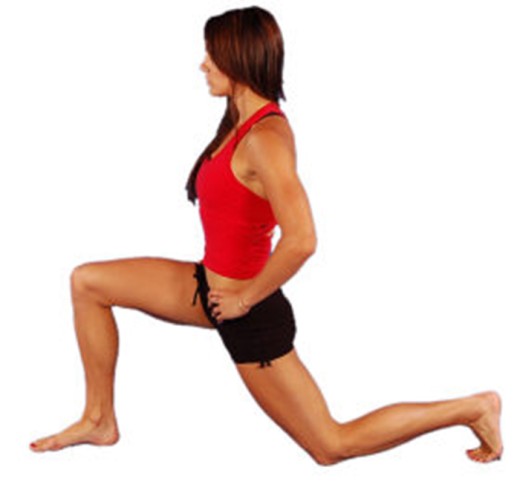
Stretching
By far the most common and therefore predominant ‘injury’ we see in practice is knee pain in runners. This is discomfort, sharp pain, or a dull ache around the kneecap or just to the outside of the knee. It can be caused by many factors, but chief among them is inflexibility of the thigh yanking on the kneecap.
The three areas of concern here are the quadriceps, iliotibial or IT band, and the worst offender, the hip flexors. Especially for those who sit at a desk most of the day.
1. Quadriceps:
Easy and not generally the guilty party. Hold your leg up behind you with your knees close together. Hold 30 seconds, navel pulled in towards the spine.
2. IT band:
Lay on a foam roller sideways and roll just below your hip-bone to just above the knee bone. Do this 20 times
3. Hip flexor:
Rest your leg on the back of a chair or couch, pull your navel into your spine, then gently lunge forward. Hold 30 seconds.
This is not to say that strengthening is not important. However, our society seems to stress strength when most running issues are soft tissue injury, not traumatic. They are generally caused by overuse, not acute injury. Because this is the case, we need to work on taking pressure off the muscles and joints initially by lengthening and resting. Strength training does the opposite. Thus, stretching is where we want to be as runners.
When to stretch? Stretching before is to help the run you’re about to take. Stretching after helps your next run. So do both!
So is running bad for your knees?
The answer depends on the person. When you are running in discomfort your body is asking you to stop. Failing to listen to this advice is what makes running harmful to the joints.
Healthy Running Weight
Running with a lot of extra weight can put too much pressure on the knee joints. Trying to maintain a healthy weight is recommended for runners.
Running Form
Most of us run as an extension of walking. No training but we need to learn proper technique. To think that we ‘just know’ how to run is not the case. If we do not learn a proper stride, we will over-use some muscles and under-utilize others, setting us up for injury. A visit to a local running coach is worth the time and money!
For similar stories, click on Stretching.